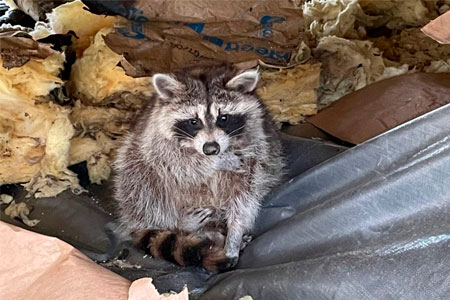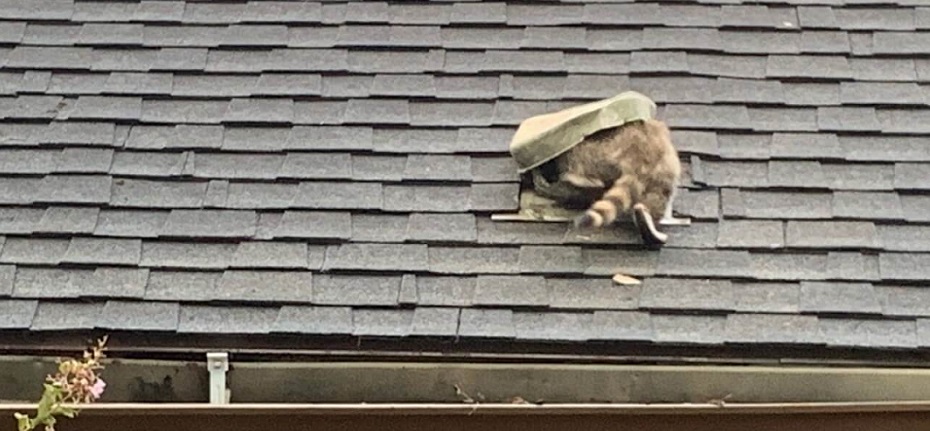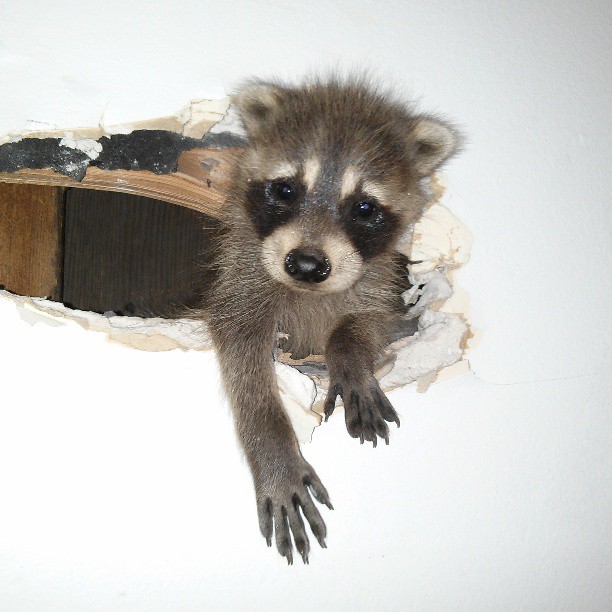Society has experienced a growing awareness of the importance of preserving wildlife. From the rise of environmental activism to the enormous growth of tourism to destinations where interacting with nature and wildlife, the positive sentiment of people living amongst animals is stronger than ever.
While wildlife plays an important role in our lives and the world around us, it is most appealing at a distance. When animal habitats clash with our own, the problems they cause are costly to both our health and to animal damage repair to our homes. In the process of using our attics, basements, chimneys, crawlspaces, and sheds for shelter, wildlife creates physical damage to homes that can be costly to repair.
A few of the animals living amongst us that create the greatest need for animal damage repair to our homes include raccoons, rodents, and squirrels. These pesky animals tear and gnaw their way in, then continue their damage indoors, where the extent of their work can remain unnoticed until the damage is severe.
Animal Entry Points
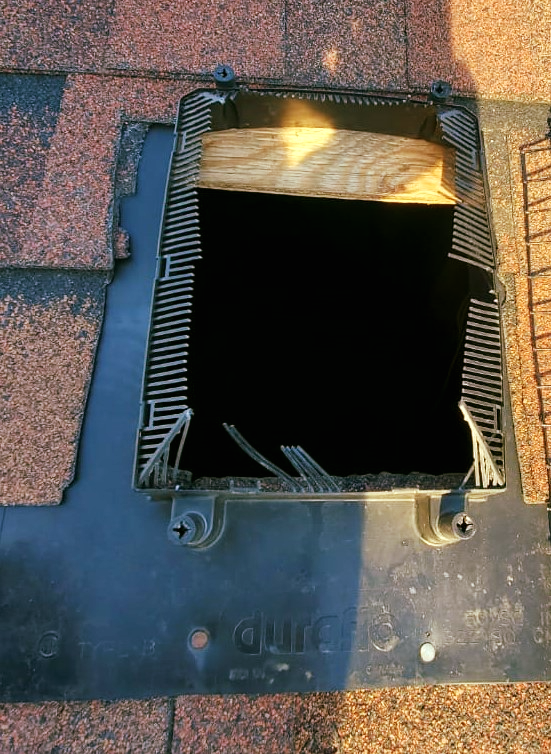
Many animals will take advantage of weaknesses in your home, such as gaps in windows and doors to squeeze through, but if none exist or the culprit is too large, they will create their own entryway. Mice and rats easily chew through the roof or siding of a home to gain entry. Raccoons are strong and agile animals who will simply rip a large hole in the roof to get inside.
Animal Dens and Nests
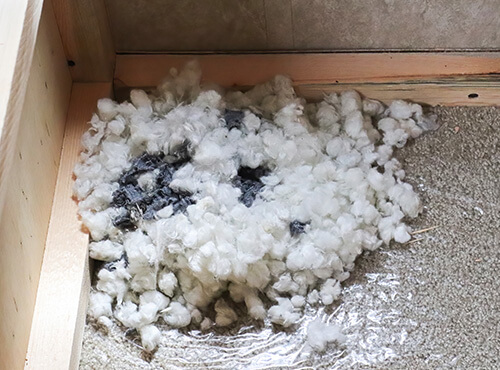
Insulation is one of the favorite materials for animals in your attic to use as the primary material for their nests. After all, it is soft and fluffy to them. By simply trampling around, they make the insulation compressed and less effective. Other den and nest locations cause different types of wildlife damage control issues:
- Nests in chimneys pose a fire hazard.
- Dens in crawl spaces or under porches and sheds can damage foundations and disrupt electrical, plumbing, and water supply wires and pipes.
- Parasites on wildlife can shed off into the dens and cause a secondary infestation.
Feces and Urine
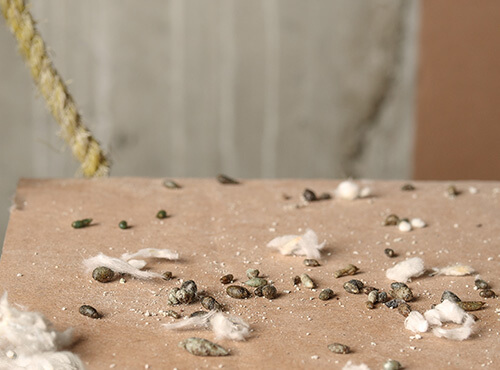
The feces and urine of an animal infestation will contaminate insulation, rot and contaminate wood, and ruin stored personal items in the attic or basement. The feces and urine of rodents such as rats and mice will not only contaminate the area surrounding their nests but also ruin the food in a pantry or cabinet. Bird feces from roosting on homes will erode the roof and paint on a home and is a slip hazard on a sidewalk or path.
Chewing and Gnawing
Rats, mice, and squirrels are voracious gnawers. As rodents, their incisors grow continuously throughout their lives. These creatures gnaw constantly to keep their teeth at a manageable length and will gnaw through wood, drywall, electric wires, and even metal pipes.
Because wildlife like to build their dens and nests in dark, secluded spaces, you might not know they are there until it’s too late. It is imperative to address wildlife in homes as soon as it is discovered to limit the damage done and mitigate any health risks. The longer an animal is in a home, the more damage it will create, making the repairs more costly.
Animal Damage Repair from Critter Control
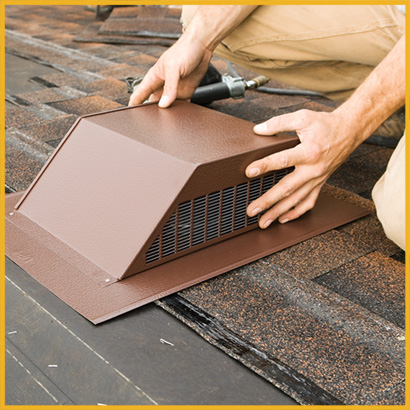
The amount and extent of wildlife damage in a residential home depends upon where the animal was located, how it gets in and out, and how long it’s lived there. Critter Control specialists inspect a home to assess the damage and then create a plan to humanely remove the animal and then repair and exclude the home from future invasions.
Attic Insulation Restoration
This is often necessary when the insulation has been tainted with feces and urine or ripped apart to build a nest. Critter Control will dispose of soiled and damaged insulation, measure your existing attic insulation, and install new attic insulation. One option open to homeowners is the installation of TAP insulation. TAP insulation is a green insulation made of recycled paper, including borates for pest control. TAP insulation not only fights infestations, but also has exceptional insulation qualities that save on heating and cooling costs and has sound-quieting qualities.
Animal Droppings Cleanup and Decontamination
Animal feces and urine left behind after the wildlife has been eradicated are important to clean up. And because animal feces can be quite unhealthy, it’s recommended that only a professional conduct animal waste clean-up. Feces can transmit disease and can also carry parasites. In addition, left sitting, it can continue to rot wood and floorboards and contaminate insulation.
Exclusion Repairs
Sealing up gaps and openings where wildlife can enter a home is a critical exclusion step for preventing future wildlife problems. Whether a small hole in your fascia board or a larger hole in your roof, Critter Control can seal these entrance points. They also caulk the tiny cracks and gaps where small mice and rats can enter and cap chimneys and vents.
Whether there’s an animal already in residence or whether doing an inspection as part of a preventive measure, use our location finder to locate the nearest Critter Control Canada Office.
Benefits of Using Critter Control Canada’s Services
For forty years, Critter Control has been committed to providing humane methods when removing animals from any residence. They take special care to think about an animal’s mating cycles, whether there are young in the house too, and nearby habitats where these animals can make a new home.
They created a program called CritterSafe to employ tactics such as non-lethal animal removal, no-trap animal control, wildlife release on-site, and one-way doors to let animals leave on their own to minimize stress.
Critter Control Canada personnel are expertly trained and maintain ongoing learning to keep up with best practices and new methods. In addition, they have a satisfaction guarantee extended to all customers. Every animal infestation is unique. Critter Control Canada creates custom wildlife damage control plans specific to each situation.
